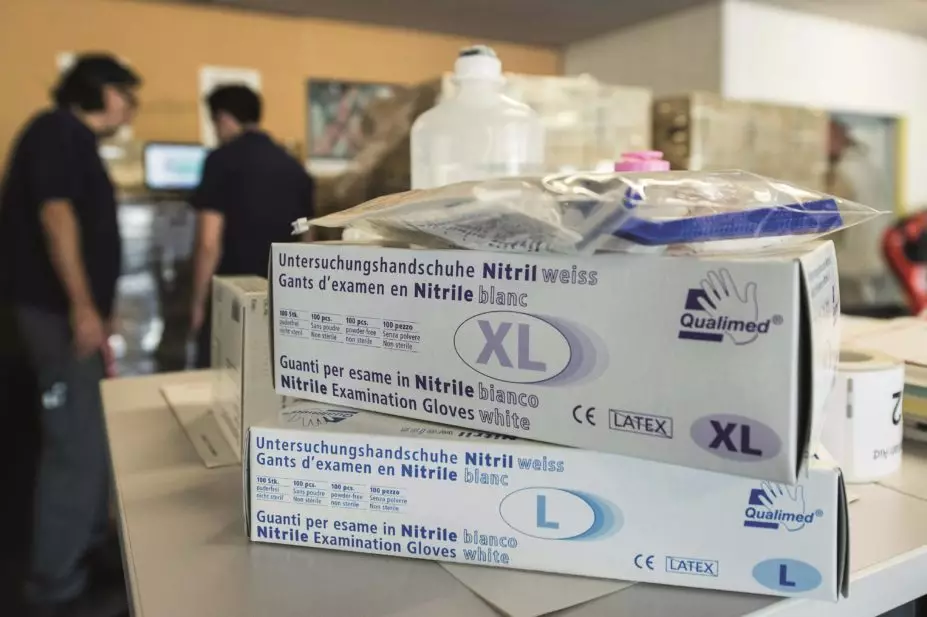
epa european pressphoto agency b.v. / Alamy
With a total of 90 representatives from Nigeria, Ghana and Cameroon at this year’s FIP congress in Bangkok, Thailand (31 August-4 September 2014), Ebola was a recurrent theme. Delegates who had visited West Africa within the previous three weeks were required to report for assessment by health officials at the airport on arrival in Bangkok. They were checked for fever, provided with information about Ebola symptoms and subsequently telephoned daily by a doctor to monitor their health.
At least one pharmacist in Sierra Leone is known to have died. A Nigerian community pharmacist, Molade Adeniyi, described precautionary measures that have been put in place to protect both staff and customers in the 22 stores of pharmacy chain Health Plus Limited. “As a high fever is one of the early signs of Ebola Virus Disease (EVD), we check the temperature of all staff and customers wishing to enter the store, using a non-contact infrared thermometer. This is particularly important as people are boycotting hospitals for fear of maybe contracting EVD and also for fear of being quarantined if they have a high fever. Anything of 38.5 degrees and above, a pharmacist politely explains to the customer that, unfortunately, they cannot be allowed in but advises them to go and see their doctor instead.”
“We know very well that 99% of these cases are not Ebola: we have other conditions in Nigeria that present with high fever, such as malaria and typhoid. But because of how contagious Ebola is it is only safe that we send them onto the doctor, let them do a rapid diagnostic test, if it is malaria they can get treated for that”. She also described how once inside the pharmacies, customers and staff used hand sanitizers, and staff wore gloves which they changed regularly. Posters promoting correct hand-washing procedures were also prominently displayed. A guide to the disease was produced by the company, enabling pharmacy staff to play a vital role in answering customers’ questions.
Pharmacies are also providing information leaflets to the public, supplied by the Association of Community Pharmacists of Nigeria (APCN). This body organised a World Health Organization-led seminar to equip pharmacists to protect themselves and educate the public. Adeniyi commented that in Nigeria pharmacists are highly trusted. This relationship is especially crucial when people are avoiding other healthcare settings such as hospitals for fear of infection.
People were initially panic-stricken when the virus reached Nigeria, Adeniyi said. “Demand for hand sanitisers, bleach, gloves and face masks instantly grew and people were stocking up copiously. In the first week when the news of the outbreak broke, we sold over 15,000 bottles of hand sanitisers. People stopped hand shaking, hugging and touching people,” Adeniyi said. The Ministry of Health reacted rapidly, using radio, newspapers and television to provide information, about EVD symptoms, prevention of infection and where to go if symptoms developed. The hospital where the primary contact was treated was shut down and an isolation centre was set up for those presenting with symptoms. Those who test positive for the virus are being managed with oxygen, analgesia and hydration, together with antibiotics, antiemetics and anti-diarrhoeals as needed, according to Adeniyi.
“People are a lot calmer now that the virus seems to have been contained with no more active cases and only people under surveillance,” Adeniyi commented. As of 7 September 2014, there were 19 confirmed cases of Ebola and 7 deaths in Nigeria, which has a population of 169 million people. All the cases so far have been traced back to exposure to the index case.
You may also be interested in
The importance of diverse clinical imagery within health education

Government should consider ways to prevent ‘inappropriate overseas prescribing’ of hormone drugs, review recommends
